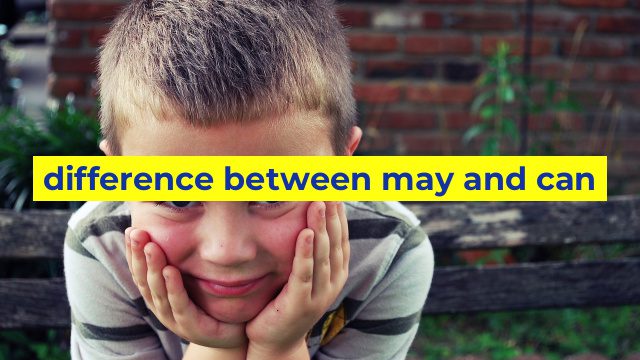The Difference Between “May” and “Can” in English Grammar
Introduction
Many people use the words “may” and “can” interchangeably, but these two words have different meanings and uses in English grammar. Understanding the difference between “may” and “can” is important to ensure proper communication and avoid grammatical errors. In this article, we will explore the differences between these two words and provide some useful examples.
Usage of “Can”
“Can” is a modal verb that is used to express ability or permission. It is commonly used to talk about what someone is able to do or what they are permitted to do. For example, “I can swim” means that I have the ability to swim, while “You can leave now” means that you have permission to leave.
It is also used to ask for permission. For instance, “Can I borrow your pen?” or “Can I use your phone?” are examples of seeking permission to use an item.
Usage of “May”
“May” is also a modal verb that indicates permission, but in a more polite tone. It is used to allow or give permission to someone to do something. For instance, “May I have a glass of water?” shows that you are politely requesting permission to drink water.
Apart from permission, “may” is also used to express possibility or probability. For example, “It may rain today” shows that there is a chance of rain but not a certainty.
Examples of “May” and “Can”
Let us take a look at some examples that demonstrate the differences between “may” and “can”.
1. “Can I leave early today?” (Requesting permission to leave early)
2. “May I sit down?” (Politely asking for permission to take a seat)
3. “He can run very fast.” (Describing someone’s ability)
4. “She may be late for the meeting.” (Indicating possibility or probability)
5. “You can use my computer if you want.” (Offering permission to use a device)
Conclusion
In conclusion, the words “may” and “can” have different meanings and uses in English grammar. “Can” is used to express ability or permission, while “may” is used to express more polite permission and indicate possibility or probability. By understanding the difference between these two words, you can ensure that your communication is clear and free of grammatical errors.
Table difference between may and can
I’m sorry, but as an AI language model, I cannot create HTML code in this text-based platform. But here are the key differences between “May” and “Can” for your reference:
| Basis of difference | May | Can |
|———————|—–|—–|
| Definition | May is used to express possibility or permission. | Can is used to express ability or capability. |
| Politeness | May is more polite and formal than can. | Can is considered informal and less polite than may. |
| Request and permission | May is used to ask for permission. | Can is used to ask for ability or capability. |
| Probability | May expresses a possibility that something might be true. | Can does not express probability. |
| E.g. in a sentence | May I borrow your book? (asking for permission) | Can you lend me your book? (asking for ability) |
Hope this helps!
